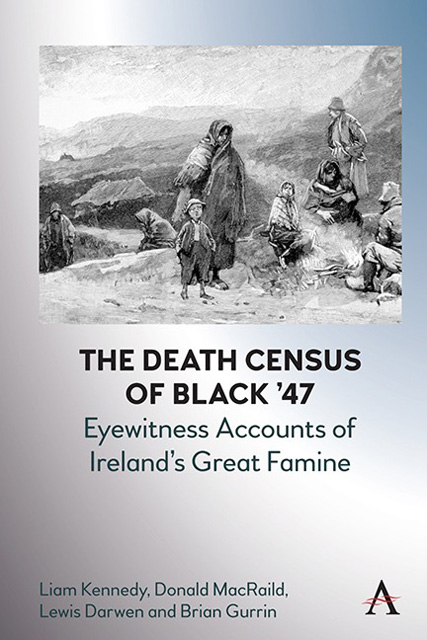Chapter Five - Eyewitness Accounts of Black ’47
Published online by Cambridge University Press: 17 October 2023
Summary
Introduction
The year 1847 has gone down in history and memory as Black ‘47. It was the second year of the Great Famine. Hunger, destitution and death were everyday occurrences. Among those best placed to convey a picture of the unfolding tragedy were the priests of the Catholic Church who ministered to three-quarters of the population. Living among people, many of whom were illiterate, particularly so in the Gaelic-speaking areas west of the Shannon and in south Munster, they were articulate witnesses for their people. They saw the Famine at its worst and some of them died in the course of their duties, mainly from epidemic fevers. This was true also of clergymen of other denominations, medical doctors and poor-law administrators, whose professions brought them in close contact with the disease-infected victims of hunger. We have seen in the last chapter that the Death Census was fundamentally a statistical survey, though one that needs to be handled with care. Its proponents wanted to quantify the effects of famine on mortality across Ireland by comparing the number of deaths between October 1846 and April 1847 against the same period a year earlier. However, in addition to providing this information most of the respondents included vivid testimony, often running into many hundreds of words on conditions in each of their parishes. They wrote about hunger, disease, swollen stomachs, insanity, emigration, death; a few even included lists of the names of the dead. Some spoke critically of political economy, proselytism, outrages, inadequate soup rations, tight-fisted rate payers, and of course of landlords, particularly if absentee. Some wrote haunting individual stories of the suffering they had witnessed, of parishioners unburied by the roadside, of workers collapsing on the public works, of families dying in the filth and cold of their cabins. They might also acknowledge acts of charity and benevolence, and profess loyalty to their ‘gracious Queen’. The panacea of repeal of the Union found frequent expression, as well as words of heartfelt devotion to the ‘Liberator’, Daniel O’Connell. Politics aside, these eyewitness accounts offer unique, personal, and frequently harrowing insights into the ravages of the Great Famine at one of its worst stages.
- Type
- Chapter
- Information
- The Death Census of Black '47Eyewitness Accounts of Ireland's Great Famine, pp. 69 - 88Publisher: Anthem PressPrint publication year: 2023



